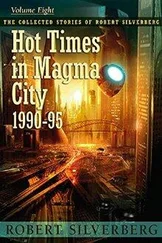Robert Silverberg - How it Was When the Past Went Away
Здесь есть возможность читать онлайн «Robert Silverberg - How it Was When the Past Went Away» весь текст электронной книги совершенно бесплатно (целиком полную версию без сокращений). В некоторых случаях можно слушать аудио, скачать через торрент в формате fb2 и присутствует краткое содержание. Год выпуска: 2007, ISBN: 2007, Издательство: Subterranean Press, Жанр: Фантастика и фэнтези, на английском языке. Описание произведения, (предисловие) а так же отзывы посетителей доступны на портале библиотеки ЛибКат.
- Название:How it Was When the Past Went Away
- Автор:
- Издательство:Subterranean Press
- Жанр:
- Год:2007
- ISBN:978-1-59606-089-0
- Рейтинг книги:4 / 5. Голосов: 1
-
Избранное:Добавить в избранное
- Отзывы:
-
Ваша оценка:
- 80
- 1
- 2
- 3
- 4
- 5
How it Was When the Past Went Away: краткое содержание, описание и аннотация
Предлагаем к чтению аннотацию, описание, краткое содержание или предисловие (зависит от того, что написал сам автор книги «How it Was When the Past Went Away»). Если вы не нашли необходимую информацию о книге — напишите в комментариях, мы постараемся отыскать её.
How it Was When the Past Went Away — читать онлайн бесплатно полную книгу (весь текст) целиком
Ниже представлен текст книги, разбитый по страницам. Система сохранения места последней прочитанной страницы, позволяет с удобством читать онлайн бесплатно книгу «How it Was When the Past Went Away», без необходимости каждый раз заново искать на чём Вы остановились. Поставьте закладку, и сможете в любой момент перейти на страницу, на которой закончили чтение.
Интервал:
Закладка:
“It’s all right, Freddy. Pete Castine was here this morning and I borrowed the three bigs from him. I’ve got my studio set up again. Come in and look?”
Munson entered. “Pete Castine?”
“A good investment for him. He makes money if he has work of mine to sell, right? It’s in his best interest to help me get started again. Carole and I have been hooking things up all day.”
“Carole?” Munson said. Mueller showed him into the studio. The paraphernalia of a sonic sculptor sat on the floor—a welding pen, a vacuum bell, a big texturing vat, some ingots and strands of wire, and such things. Carole was feeding discarded packing cases into the wall disposal unit. Looking up, she smiled uncertainly and ran her hand through her long dark hair.
“Hello, Freddy.”
“Everybody good friends again?” he asked, baffled.
“Nobody remembers being enemies,” she said. She laughed. “Isn’t it wonderful to have your memory blotted out like this?”
“Wonderful,” Munson said bleakly.
Commander Braskett said, “Can I offer you people any water?”
Tim Bryce smiled. Lisa Bryce smiled. Ted Kamakura smiled. Even Mayor Chase, that poor empty husk, smiled. Commander Braskett understood those smiles. Even now, after three days of close contact under pressure, they thought he was nuts.
He had had a week’s supply of bottled water brought from his home to the command post here at the hospital. Everybody kept telling him that the municipal water was safe to drink now, that the memory drugs were gone from it; but why couldn’t they comprehend that his aversion to public water dated back to an era when memory drugs were unknown? There were plenty of other chemicals in the reservoir, after all.
He hoisted his glass in a jaunty toast and winked at them.
Tim Bryce said, “Commander, we’d like you to address the city again at half past ten this morning.”
Braskett scanned the sheet. It dealt mostly with the relaxation of the order to boil water before drinking it. “You want me to go on all media,” he said, “and tell the people of San Francisco that it’s safe for them to drink from the taps, eh? That’s a bit awkward for me. Even a figurehead spokesman is entitled to some degree of personal integrity.”
Bryce looked briefly puzzled. Then he laughed and took the text back. “You’re absolutely right, commander. I can’t ask you to make this announcement, in view of—ah—your particular beliefs. Let’s change the plan. You open the spot by introducing me, and I’ll discuss the no-boiling thing. Will that be all right?”
Commander Braskett appreciated the tactful way they deferred to his special obsession. “I’m at your service, doctor,” he said gravely.
Bryce finished speaking and the camera lights left him. He said to Lisa, “What about lunch? Or breakfast, or whatever meal it is we’re up to now.”
“Everything’s ready Tim. Whenever you are.”
They ate together in the holograph room, which had become the kitchen of the command post. Massive cameras and tanks of etching fluid surrounded them. The others thoughtfully left them alone. These brief shared meals were the only fragments of privacy he and Lisa had had, in the fifty-two hours since he had awakened to find her sleeping beside him.
He stared across the table in wonder at this delectable blonde girl who they said was his wife. How beautiful her soft brown eyes were against that backdrop of golden hair! How perfect the line of her lips, the curve of her earlobes! Bryce knew that no one would object if he and Lisa went off and locked themselves into one of the private rooms for a few hours. He wasn’t that indispensable; and there was so much he had to begin relearning about his wife. But he was unable to leave his post. He hadn’t been out of the hospital or even off this floor for the duration of the crisis; he kept himself going by grabbing the sleep wire for half an hour every six hours. Perhaps it was an illusion born of too little sleep and too much data, but he had come to believe that the survival of the city depended on him. He had spent his career trying to heal individual sick minds; now he had a whole city to tend to.
“Tired?” Lisa asked.
“I’m in the tiredness beyond feeling tired. My mind is so clear it that my skull wouldn’t cast a shadow. I’m nearing nirvana.”
“The worst is over, I think. The city’s settling down.”
“It’s still bad, though. Have you seen the suicide figures?”
“Bad?”
“Hideous. The norm in San Francisco is 220 a year. We’ve had close to five hundred in the last two and a half days. And that’s just the reported cases, the bodies discovered and so on. Probably we can double the figure. Thirty suicides reported Wednesday night, about two hundred on Thursday, the same on Friday, and about fifty so far this morning. At least it seems as if the wave is past its peak.”
“But why, Tim?”
“Some people react poorly to loss. Especially the loss of a segment of their memories. They’re indignant—they’re crushed—they’re scared—and they reach for the exit pill. Suicide’s too easy now, anyway. In the old days you reacted to frustration by smashing the crockery; now you go a deadlier route. Of course, there are special cases. A man named Montini they fished out of the bay—a professional mnemonist, who did a trick act at nightclubs, total recall. I can hardly blame him for caving in. And I suppose there were a lot of others who kept their business in their heads—gamblers, stock-market operators, oral poets, musicians—who might decide to end it all rather than try to pick up the pieces.”
“But if the effects of the drug wear off—”
“Do they?” Bryce asked.
“You said so yourself.”
“I was making optimistic noises for the benefit of the citizens. We don’t have any experimental history for these drugs and human subjects. Hell, Lisa, we don’t even know the dosage that was administered; by the time we were able to get water samples most of the system had been flushed clean, and the automatic monitoring devices at the city pumping station were rigged as part of the conspiracy so they didn’t show a thing out of the ordinary. I’ve got no idea at all if there’s going to be any measurable memory recovery.”
“But there is, Tim. I’ve already started to get some things back.”
“What?”
“Don’t scream at me like that! You scared me.”
He clung to the edge of the table. “Are you really recovering?”
“Around the edges. I remember a few things already. About us.”
“Like what?”
“Applying for the marriage license. I’m standing stark naked inside a diagnostat machine and a voice on the loudspeaker is telling me to look straight into the scanners. And I remember the ceremony, a little. Just a small group of friends, a civil ceremony. Then we took the pod to Acapulco.”
He stared grimly. “When did this start to come back?”
“About seven this morning, I guess.”
“Is there more?”
“A bit. Our honeymoon. The robot bellhop who came blundering in on our wedding night. You don’t—”
“Remember it? No. No. Nothing. Blank.”
“That’s all I remember, this early stuff.”
“Yes, of course,” he said. “The older memories are always the first to return in any form of amnesia. The last stuff in is the first to go.” His hands were shaking, not entirely from fatigue. A strange desolation crept over him. Lisa remembered. He did not. Was it a function of her youth, or of the chemistry of her brain, or—?
He could not bear the thought that they no longer shared an oblivion. He didn’t want the amnesia to become one-sided for them; it was humiliating not to remember his own marriage when she did. You’re being irrational, he told himself. Physician, heal thyself!
Читать дальшеИнтервал:
Закладка:
Похожие книги на «How it Was When the Past Went Away»
Представляем Вашему вниманию похожие книги на «How it Was When the Past Went Away» списком для выбора. Мы отобрали схожую по названию и смыслу литературу в надежде предоставить читателям больше вариантов отыскать новые, интересные, ещё непрочитанные произведения.
Обсуждение, отзывы о книге «How it Was When the Past Went Away» и просто собственные мнения читателей. Оставьте ваши комментарии, напишите, что Вы думаете о произведении, его смысле или главных героях. Укажите что конкретно понравилось, а что нет, и почему Вы так считаете.












